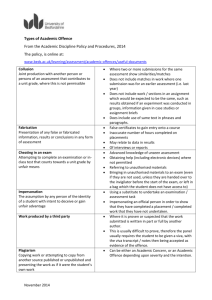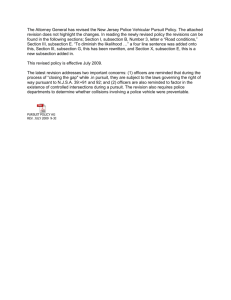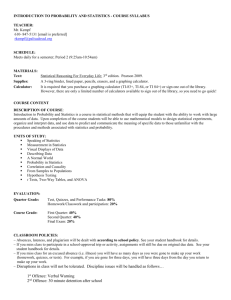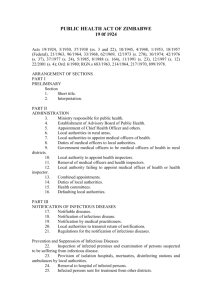M.L.Act,1996JA
advertisement
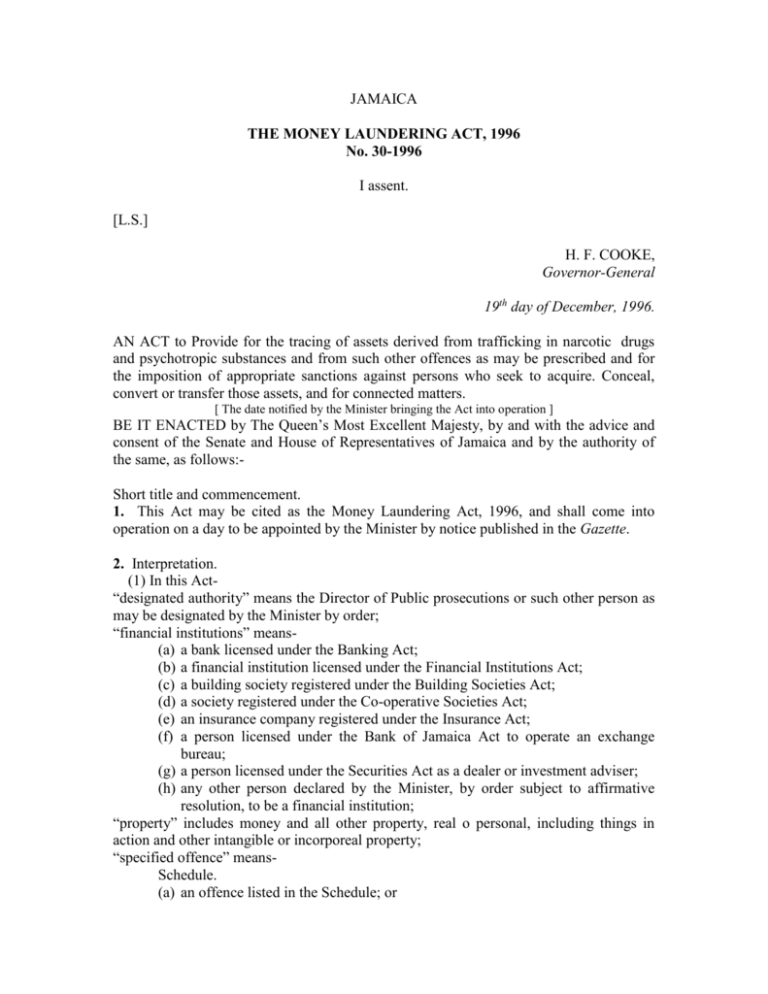
JAMAICA THE MONEY LAUNDERING ACT, 1996 No. 30-1996 I assent. [L.S.] H. F. COOKE, Governor-General 19th day of December, 1996. AN ACT to Provide for the tracing of assets derived from trafficking in narcotic drugs and psychotropic substances and from such other offences as may be prescribed and for the imposition of appropriate sanctions against persons who seek to acquire. Conceal, convert or transfer those assets, and for connected matters. [ The date notified by the Minister bringing the Act into operation ] BE IT ENACTED by The Queen’s Most Excellent Majesty, by and with the advice and consent of the Senate and House of Representatives of Jamaica and by the authority of the same, as follows:Short title and commencement. 1. This Act may be cited as the Money Laundering Act, 1996, and shall come into operation on a day to be appointed by the Minister by notice published in the Gazette. 2. Interpretation. (1) In this Act“designated authority” means the Director of Public prosecutions or such other person as may be designated by the Minister by order; “financial institutions” means(a) a bank licensed under the Banking Act; (b) a financial institution licensed under the Financial Institutions Act; (c) a building society registered under the Building Societies Act; (d) a society registered under the Co-operative Societies Act; (e) an insurance company registered under the Insurance Act; (f) a person licensed under the Bank of Jamaica Act to operate an exchange bureau; (g) a person licensed under the Securities Act as a dealer or investment adviser; (h) any other person declared by the Minister, by order subject to affirmative resolution, to be a financial institution; “property” includes money and all other property, real o personal, including things in action and other intangible or incorporeal property; “specified offence” meansSchedule. (a) an offence listed in the Schedule; or (b) an act or omission that occurred outside Jamaica which, had it occurred in Jamaica, would have constituted such an offence; “transaction” includes the receiving or making of a gift. (2) The Minister may, by order subject to affirmative resolution, amend the Schedule. Money laundering. 3. (1) A person shall be taken to engage in money laundering if that person(a) engages in a transaction that involves property that is derived from the commission of a specified offence; or (b) acquires, possesses, uses, conceals, disguises, disposes of or brings into Jamaica, any such property; or (c) converts or transfers that property or removes it from Jamaica, and the person knows, at the time he engages in the transaction referred to in paragraph (a) or at the time he does any act referred to in paragraph (b) or (c), that the property is derived or realized directly, or indirectly from the commission of a specified offence. (2) A person who, after the commencement of this Act, engages in money laundering is guilty of an offence and is liable(a) on summary conviction before a Resident Magistrate(i) in the case of an individual, to a fine not exceeding one million dollars or to imprisonment for a term not exceeding five years or to both such fine and imprisonment; (ii) in the case of a body corporate, to a fine not exceeding three million dollars; (b) on conviction in a Circuit Court(i) in the case of an individual, to a fine or to imprisonment for a term not exceeding twenty years or to both such fine and imprisonment; (ii) in the case of a body corporate, to a fine. (3) An attorney-at-law shall not be taken to engage in money laundering to the extent that he receives bona fide fees for legal representation of a person charged with an offence under this section or with a specified offence. (4) Nothing in this shall apply to(a) a bona fide purchaser for value without notice in relation to property described in this section; or (b) a person who enters into any subsequent transaction relating to that property, so, however, that this paragraph shall not apply in any case where a person enters into any such subsequent transaction involving the use of other property, knowing that the other property is derived from the commission of a specified offence. Meaning of concealing or disguising. 4. A reference in section 3 (1) (b) to concealing or disguising any property includes a reference to concealing or disguising its nature, source, location, disposition, movement or ownerships or any rights with respect to it. Conspiring, aiding, abetting etc., commission of offence of money laundering. 5. A person who conspires with another to commit, or aids, abets, counsels, or procures, the commission of, an offence under the section 3, is guilty of an offence and is liable- (a) on summary conviction before a Resident Magistrate(i) in the case of an individual, to a fine not exceeding one million dollars or to imprisonment for a term not exceeding five years or to both such fine and imprisonment; (ii) in the case of a body corporate, to a fine not exceeding three million dollars; (b) on conviction in a Circuit Court(i) in the case of an individual, to a fine or to imprisonment for a term not exceeding twenty years or to both such fine and imprisonment; (ii) in the case of a body corporate, to a fine. Duty of financial institution to report certain transactions. 6.- (1) It shall be the duty of a financial institution to make a report to the designated authority, either on its own initiative or in response to a request made to it by the designated authority, in relation to any transaction involving the prescribed amount being carried out by any person with that institution. (2) A financial institution which makes a report under the subsection (1) to the designated authority shall not disclose the existence of that report to any other person. (3) Where a financial institution makes a report in accordance with subsection (1), that institution, its directors and employees shall be exempt from(a) any liability to prosecution for an offence under the section 3 or 5; (b) any criminal, civil or administrative liability, as the case may be, for breach of any restriction on disclosure of information imposed by contract or by any legislative, regulatory or administrative provision, regardless of the outcome of the report. (4) In making a report under the subsection (1) a financial institution shall comply with such directions as may be given by the designated authority. (5) A financial institution which fails to comply with subsection (1), (2) or (4) is guilty of an offence and liable on summary conviction in a Resident Magistrate’s Court to a fine not exceeding four hundred thousand dollars. (6) In subsection (1) “the prescribed amount” means ten thousand dollars or more in the currency of the United States of America or an equivalent amount in Jamaican currency. Regulatory controls by financial institutions. 7.- (1) A financial institution shall establish and implement such programmes, policies, procedures and controls as may be necessary for the purpose of preventing or detecting money laundering. (2) Without prejudice to the generality of subsection (1), the programmes referred to in that subsection shall include(a) the establishment of procedures to ensure high standars of integrity of employees; (b) the development of a system to evaluate the personal employment and financial history of those employees; (c) the establishment of programmes for training of employees on a continuing basis and for instructing employees as to their responsibilities in respect of the provisions of this Act; (d) arrangements for an independent audit in order to ensure that the programmes as aforesaid are being implemented. (3) For the purposes of this section, a financial institution shall designate an officer of the institution who performs management functions to be responsible for ensuring the implementation of the programmes, policies, procedures and controls referred to in subsection (1), including the reporting of transactions referred to in section 6. (4) A financial institution shall consult with the competent authority for the purpose of carrying out its obligations under the section. (5) In this section “competent authority” means the Minister or such other person as he may specify in writing for the purpose of this section. (6) A financial institution which fails to comply with subsection (1) or (3) is guilty of an offence and liable on summary conviction before a Resident Magistrate to a fine not exceeding four hundred thousand dollars. Monitoring orders. 8.- (1) The Director of Public Prosecutions may apply to a Judge in Chambers in accordance with subsection (3) for an order (in this section referred to as a “monitoring order”) directing a financial institution to give to a constable named by the Director of Public Prosecutions in the application, information and such documents as the Director of Public Prosecutions may specify in the application, other than items subject to legal privilege. (2) The constable referred to in subsection (1) shall be a constable designated in writing by the Commissioner of Police. (3) An application under subsection (1) shall be made ex parte and shall be in writing and be accompanied by an affidavit. (4) A monitoring order shall direct a financial institution to disclose information or to produce documents, or both, obtained by or under the control of the institution about transactions conducted through an account held by a particular person with the institution. (5) A monitoring order shall apply in relation to transactions conducted during the period specified in the order, being a period commencing not earlier than the day on which notice of the order is given to the financial institution and ending not later than three months after the date of the order. (6) A Judge shall not make a monitoring order unless he is satisfied that there are reasonable grounds for suspecting that the person in respect of whose account the information is or documents are sought(a) has committed or is about to commit an offence under section 3 or 5; (b) was involved in the commission, or is about to be involved in the commission of, such an offence; or (c) has benefited directly or indirectly, or is about to benefit directly or indirectly, from the commission of that offence. (7) A monitoring order shall specifiy(a) the name or names in which the account is believed to be held; (b) the class of information and a description of any documents that the institution is required to give; and (c) the name of the constable to whom the information is or documents are to be given and the manner in which it is or they are to be given. (8) A financial institution that is notified of a monitoring order and knowingly(a) contravenes the order; or (b) provides false or misleading information or documents in purported compliance with the order, is guilty of an offence and is liable on summary conviction in a Resident Magistrate’s Court to a fine not exceeding one million dollars. (9) A reference in this section to a transaction conducted through an account includes a reference to(a) the making of a fixed term deposit; (b) in relation to a fixed term deposit, the transfer of the amount deposited or any part thereof at the end of the term; and (c) the opening, existence or use of a deposit box held by the institution. (10) Nothing in section 3 shall apply to a financial institution that is subject to a monitoring order in so far as that institution continues to conduct business with the person to whom the order relates. Monitoring orders not to be disclosed. 9. (1) A financial institution that is, or has been, subject to a monitoring order shall not disclose the existence or the operation of the order to any person except(a) an officer or agent of the institution, for the purpose of ensuring that the order is complied with; (b) an attorney-at-law, for the purpose of obtaining legal advice or representation in relation to the order. (2) A person referred to in subsection (1) (a) or (b) to whom disclosure of the existence or operation of a monitoring order has been made and a constable referred to in section 8 (1) shall not(a) disclose the existence or operation of the order except to another person referred to in that subsection for the purposes of(i) the performance of that person’s duties, if the disclosure is made by the constable referred to in section (8) (1); (ii) ensuring that the order is complied with or obtaining the legal advice or representation in relation to the order, if the disclosure is made by an officer or agent of the institution; or (iii) giving legal advice or making representations in relation to the order, if the disclosure is made by an attorney-at-law; or (b) make a record of or disclose the existence or the operation of the order in any circumstances even when he ceases to be a person referred to in subsection (1). (3) Nothing in subsection (2) prevents the disclosure by a person referred to in subsection (1) (b) of the existence or operation of a monitoring order(a) for the purposes of, or in connection with, legal proceedings; or (b) in the course of proceedings before a court. (4) A person referred to in subsection (1) (b) shall not be required to disclose to any court the existence or operation of a monitoring order. (5) A person who contravenes subsection (1) or (2) is guilty of an offence and is liable on summary conviction in a Resident Magistrate’s Court(a) in the case of an individual, to a fine not exceeding two hundred thousand dollars or to imprisonment for a term not exceeding three years or to both such fine and imprisonment; (b) in the case of a body corporate, to a fine not exceeding six hundred thousand dollars. (6) A reference in this section to disclosing the existence or operation of a monitoring order to a person includes a reference to disclosing information to the person from which that person could reasonably be expected to infer the existence or operation of the monitoring order. Regulations. 10. The Minister may make regulations generally for giving effect to the provisions and purposes of this Act. SCHEDULE (Section 2) Specified Offences 1. The production, manufacture, extraction, preparation, offering (including offering for sale) distribution, sale, delivery on any terms whatsoever, brokerage, dispatch (including dispatch in transit) transport, importation or exportation of any narcotic drug or any psychotropic substance contrary to the provisions of the Dangerous Drugs Act. 2. The cultivation of opium poppy, coca bush or cannabis plant for the purpose of the production of narcotic drugs contrary to the provisions of the Dangerous Drugs Act. 3. The possession or purchase of any narcotic drug or psychotropic substance for the purpose of any of the activities referred to in paragraph 1. 4. The organization, management or financing of any of the offences specified in paragraph 1, 2 or 3. 5. Publicly inciting or inducing others, by any means, to commit any of the other offences referred to in this Schedule or to use narcotic drugs or psychotropic substances contrary to the Dangerous Drugs Act. 6. Conspiracy to commit, attempts to commit and aiding, abetting, procuring or counselling the commission of any of the other offences listed in this Schedule.


